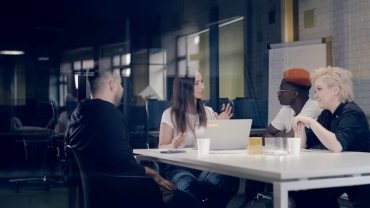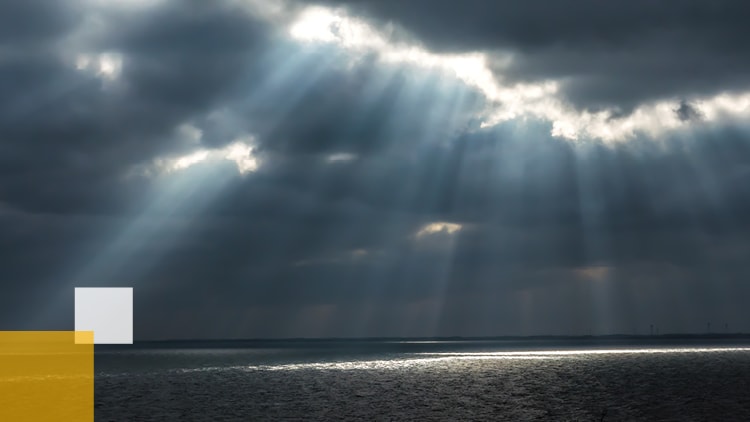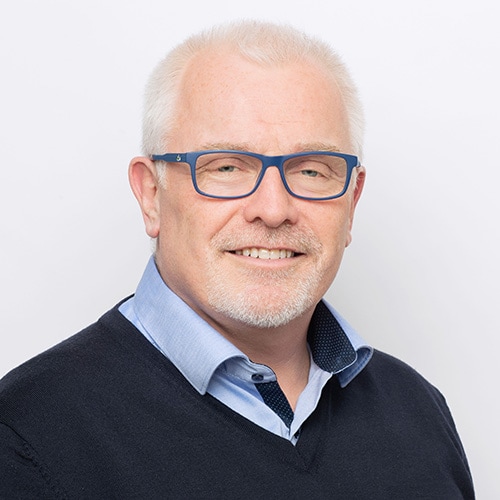

“I was told that two of our people were inside fighting the fire and my brain was telling me to jump in and help them.”
Vincent Cleary | CEO of Glenisk
As Vincent Cleary walked out of Tullamore Hospital on the morning of 27 September 2021, he switched on his phone to a wave of text messages and missed calls. The CEO of Glenisk had been in for a routine check-up following a heart attack six weeks earlier and while the volume of messages was surprising, the content was not.
“I was told that the fire alarm had gone off at the factory, but I was assured that it was a false alarm,” he said. “We heat-seal the lids to our yoghurt posts and now and again, a pot will get stuck and smoulder a bit. It was nothing unusual, so I made my way home to grab a cup of tea before heading to work.”
By the time Vincent reached the factory, the building had been evacuated in line with protocol. The fire was intensifying, although it still appeared to be a minor fire, and Vincent’s instinct was for action. “I was told that two of our people were inside fighting the fire and my brain was telling me to jump in and help them,” he said. “As far as I was concerned, we just needed to put it out but I was told that wasn’t permitted. So, we got the two guys out and waited for the fire brigade. It was the longest 20 minutes of my life.”
In the meantime, the smoke intensified. When the firefighters attempted to enter the factory, they were pushed back by the flames and the fire quickly spread. Soon after, Vincent realised that the factory was gone.

“My father, who started the business, wouldn’t have stood for anything other than getting the business back up and running.”
—Vincent Cleary
From ruins to reinvention
As Vincent and his colleagues stood in an adjacent field and watched his family business—and their livelihoods—go up in flames, Vincent’s mind was already in solution mode. “My father, who started the business, wouldn’t have stood for anything other than getting the business back up and running. And that’s what we set about doing,” he said.
His first priority was communicating with his people. “It was the darkest day in our history but people still needed some certainty. Otherwise, they would show up at the site the next morning,” he said. “So I texted everyone on our WhatsApp group and told them to stay at home on full pay until further notice. But when I went up to the site the next day, I was surprised to see so many staff—they turned up regardless to see if they could help.”
As Vincent spoke to small groups of colleagues, he quickly realised that he needed to set a direction. “I got my team around me at that point and asked them to come up with a list of things we would need to do to be back in business by Christmas,” he added. “We reconvened a short time later and created a plan that essentially got us up and running four months later.”

“The fire did have a silver lining in the sense that it has allowed us to fast-forward our sustainability journey.”
— Vincent Cleary
Sustainable transformation
Through a mixture of kindness, hard work and luck, Vincent and his team made steady progress. From temporarily rerouting Glenisk’s incoming organic milk supply to supportive cooperatives to repurposing an old milk bottling plant with no electricity or running water, Vincent maintained some degree of income and re-started production with just three milk products. Today, Glenisk is producing 40% of its traditional product mix in a new factory on the same site—but the company’s ambition isn’t to simply return to the days of old. It’s to become the most sustainable yoghurt manufacturer in Europe.
“The fire did have a silver lining in the sense that it has allowed us to fast-forward our sustainability journey,” Vincent said. “In 2020, one of my fellow directors asked me about transitioning away from plastic packaging following a query from a customer. At that time, I expected it to take us three to five years because we had perfectly good machinery onsite that represented a huge investment. But the fire effectively wiped the slate clean.”
Today, all Glenisk yoghurt is packaged in paper pots. With inflation in paper and cardboard, Vincent is “paying through the nose” for this choice, but he remains convinced that it’s the right one. “We had a five-year plan at one stage but the disaster of 2021 allowed us to conduct a complete root and branch review of our business. Our plan is to build a new factory on a greenfield site and enable us to split our physical footprint—but our plants will be carbon neutral,” he added.
A new appreciation for risk
With eyes focused firmly on the future, Vincent isn’t one for dwelling on the past. But what has he learned from the last two turbulent years? “As a company, we looked at risk from a variety of perspectives—from reputational to financial. But what we didn’t consider was losing our only factory,” he said.
However, his decision to build a second factory is driven by ambition rather than fear. “We don’t expect our business to be ravaged again the way it was in 2021,” he added. “Once I got over the shock and grief and buoyed by the outpouring of support from our customers, I began to realise that we could still be ambitious—and indeed, more ambitious than we have ever been.”

Ciarán Kelly
Partner, PwC Ireland







Menu